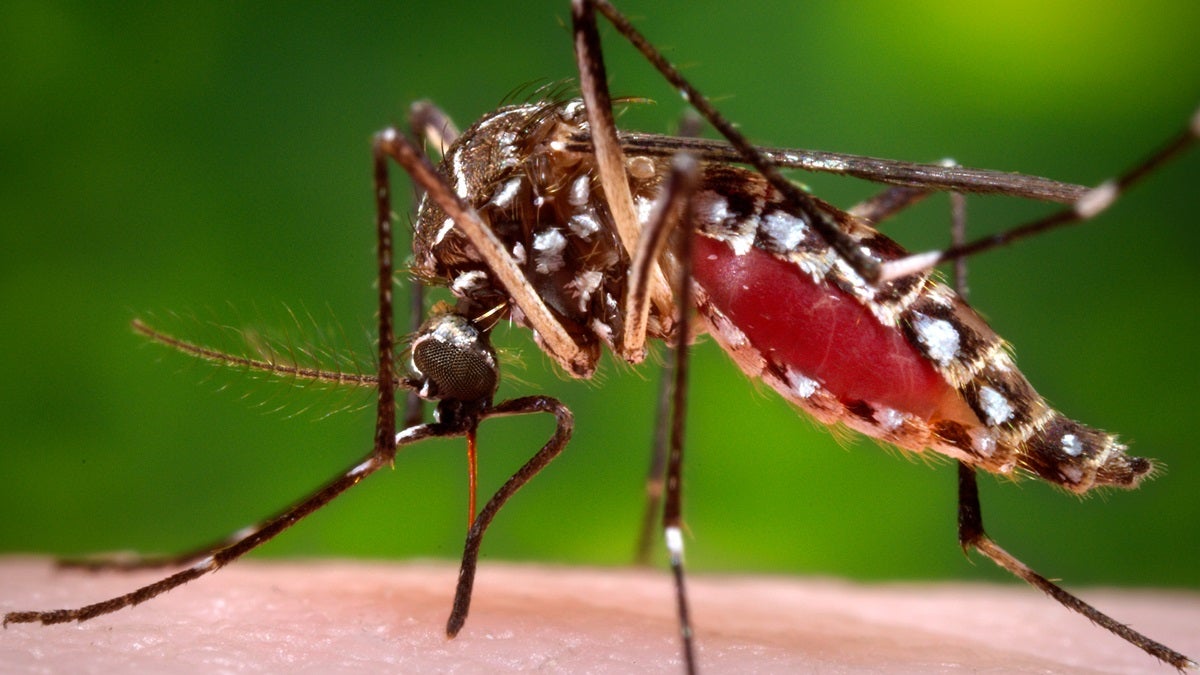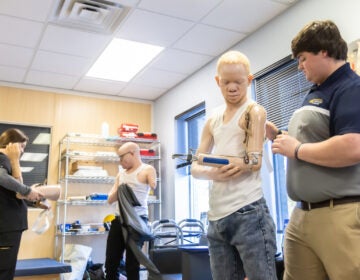‘Prime time for getting bitten’: State and local officials target mosquitoes preemptively to thwart West Nile virus
No one is sounding the alarm: It’s been an average year so far for West Nile cases in mosquitoes. But wet, warm conditions might mean trouble ahead.

Mosquito (James Gathany/Centers for Disease Control and Prevention via AP)
Mosquito populations across the Delaware Valley are testing positive for the West Nile virus, prompting some municipalities to strike preemptively against everyone’s not-so-favorite bloodthirsty insect.
State and local officials in the region are not sounding the alarm just yet — they say it has been an average year so far for West Nile virus cases in mosquitoes. But with the warm and unusually wet weather of late, mosquito season is hitting its peak, boosting the potential.
“This is prime time for getting bitten by mosquitoes. Just last week, we reported that there was the first case of human West Nile virus in Philly — it was in an older person. And that’s always a threat at this time of season, that there may be a human case,” said Philadelphia Department of Public Health spokesperson James Garrow.
With its Vector Control Services program, the city Health Department is working to shrink mosquito populations by targeting larvae in standing water, as well as closely monitoring mosquito populations to see if they are carrying the virus. The Vector Control staff is also available for on-site consultation to address properties with excessive mosquito issues. The number to call is 215-685-9000.
For the first time, the city also has a new Pennsylvania-funded program that allows for the nighttime spraying of a nontoxic larvicide.
“The treatment only really works on black flies and mosquitoes. So this isn’t something that harms pets or wildlife in the area. It’s safe if it lands on people’s porches and any toys that happen to be outside,” Garrow said. “We’ve been doing this every week throughout the summer and good results from it, we think that it’s having an impact in some of those areas that we’ve been able to treat.”
In Montgomery County, officials are going so far as to request that residents in Abington and Norristown remain indoors, close windows, and shut off ventilation systems on certain days so that county workers can spray adulticide — a type of insecticide specifically for adult mosquitoes.
As mitigation efforts go, adult spraying is usually the final step on the list.
“Spraying is kind of a last resort, what we do more of, and it’s many, many times more of, is larviciding,” said Steve Gerloff, the county’s environmental field services supervisor for its mosquito program.
Although the spraying is targeted, the county considers West Nile virus to be endemic to mosquitoes in every single one of its municipalities.
“And within the last three, four weeks, we’ve seen an exponential rise in the number of positives we have been collecting in the county,” Gerloff said.
In most years, mosquito samples start to come back positive for West Nile around mid-July to August. The county uses a complicated system to trap female mosquitoes over stagnant water and send them to the state for testing.
Removing stagnant water to prevent mosquito eggs from hatching is still the best option, but it’s not always possible. The next step is larviciding, which involves the use of natural bacteria to stop the insects from maturing into adults and breeding.
“And we do that, I would say, 100 times for every one mosquito spray that we do,” Gerloff said.
Removing stagnant water to prevent mosquito eggs from hatching is still the best option, but it’s not always possible. The next step is larviciding, which involves the use of natural bacteria to stop the insects from maturing into adults and breeding.
“And we do that, I would say, 100 times for every one mosquito spray that we do,” Gerloff said.
So far, there have been no reported cases of West Nile virus in humans in Montgomery County, but Gerloff said there is often a lag.
“Positive people can show up in October, November, even in December. It sometimes takes a while for the person or the physicians to realize that’s exactly what they have,” Gerloff said.
New Jersey has had reported human cases of West Nile virus this year — and even a recent death in Camden.
Delaware has managed to avoid human cases for the moment, but birds in the state haven’t been so lucky.
“We’ve got indications this summer of West Nile virus, so far, in our sentinel chickens,” said William Meredith, an administrator with the Delaware Department of Natural Resources and Environmental Control. “Sentinel chickens are test organisms that we set out at 20 stations around the state. We sample the chickens every other week.”
People shouldn’t panic, Meredith said — they should simply take steps to avoid mosquitoes. If they can’t, he advises common-sense precautions such as good water sanitation, insect repellant, and long clothing and darker colors.
“Avoid wearing perfumes, cosmetics that can serve as an attractant. If you can, avoid strenuous activity, so you’re not exhaling a lot of carbon dioxide, which will also serve as an attractant to mosquitoes,” he said. “So there are things that people can do to reduce their exposure in terms of what they wear, what they apply, how they behave, or act.”

Get daily updates from WHYY News!
WHYY is your source for fact-based, in-depth journalism and information. As a nonprofit organization, we rely on financial support from readers like you. Please give today.







